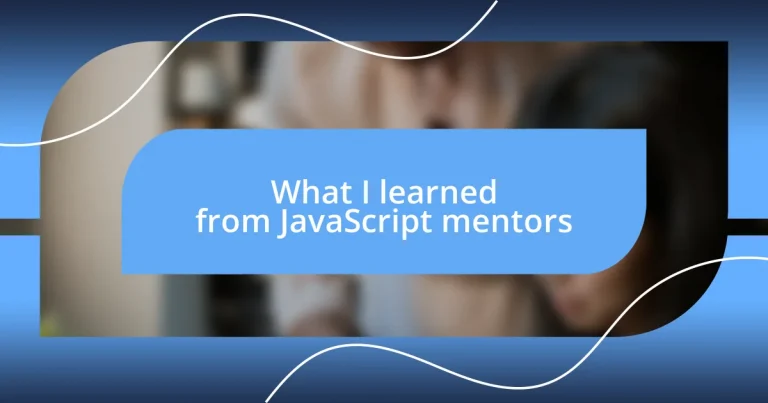Key takeaways:
- Mentorship enhances problem-solving skills through encouragement, empathy, and shared experiences of both successes and failures.
- Key coding practices such as debugging, code readability, and collaboration significantly improve a developer’s effectiveness and confidence in their work.
- Choosing the right mentor based on expertise, communication style, and commitment accelerates career growth and fosters valuable networking opportunities.
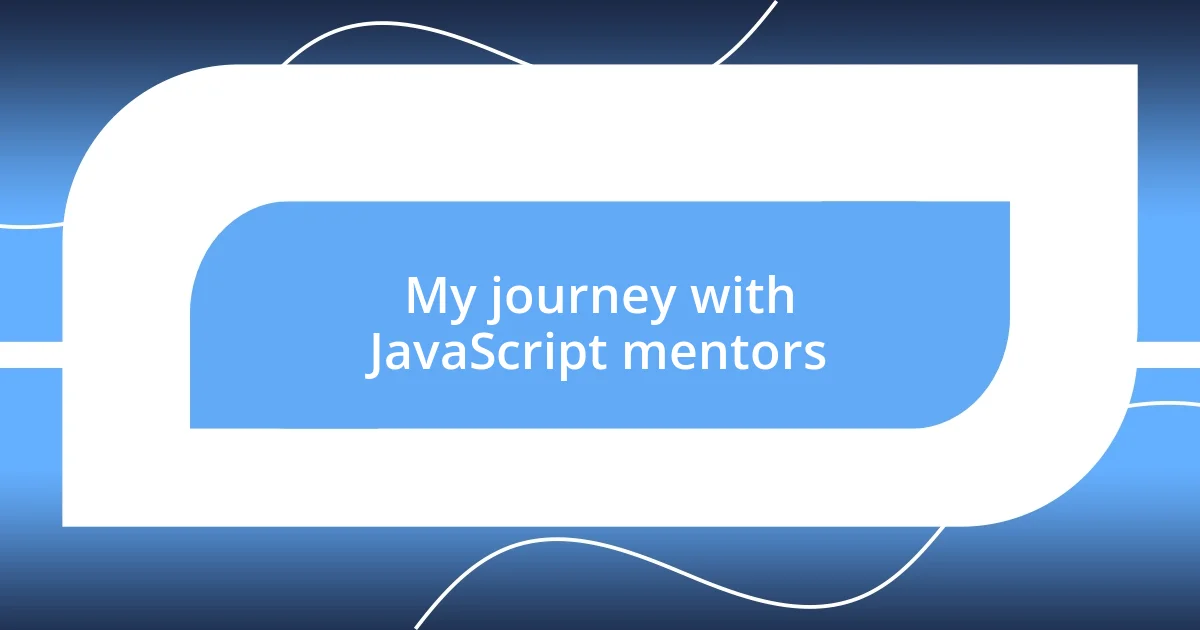
My journey with JavaScript mentors
As I look back on my journey with JavaScript mentors, I can’t help but recall my first coding bootcamp experience. I was overwhelmed, yet my mentor patiently guided me through the maze of syntax errors and complex concepts. His encouragement made me wonder: how many beginners out there experience that same daunting feeling before a breakthrough?
One particularly memorable moment was during a challenging project where I felt completely stuck. My mentor suggested I take a step away to clear my mind—a simple yet profound piece of advice that transformed my perspective. Have you ever noticed how stepping back can sometimes give you the clarity to tackle a problem head-on? I realized that my mentors weren’t just teaching me code; they were shaping my approach to problem-solving.
Through countless pair programming sessions, I discovered that the real magic happened during those candid conversations about challenges we faced. My mentors didn’t just share their expertise; they also shared their struggles and failures. It made me think: what if our mistakes are the best teachers? This honesty humanized the learning process and inspired me to embrace my own missteps along the way.
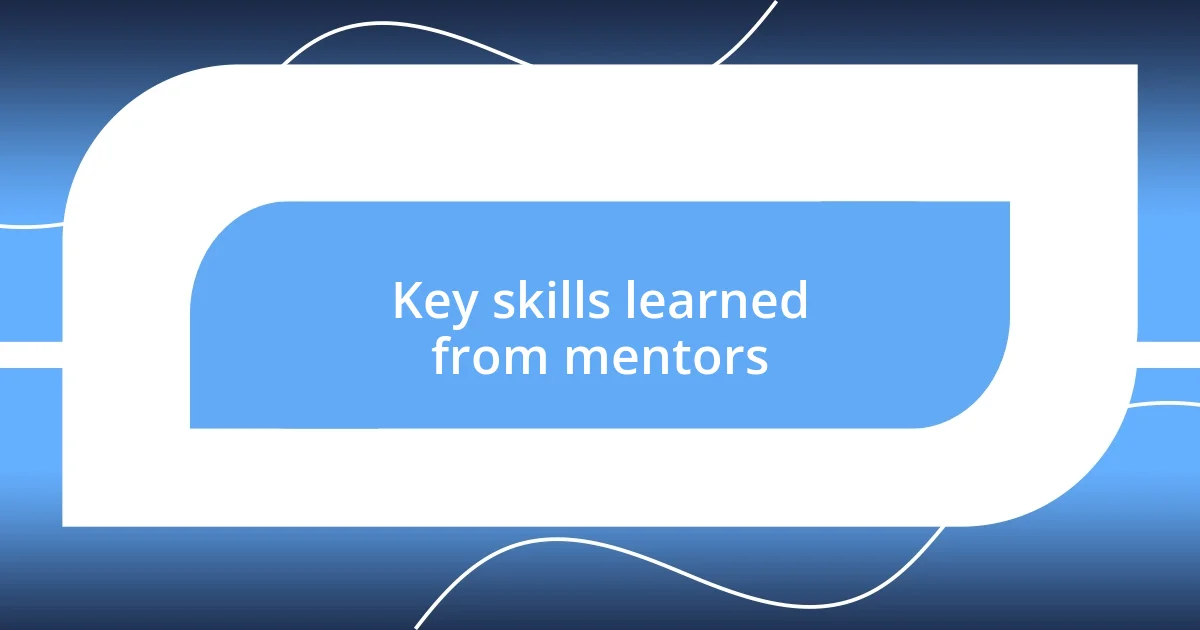
Key skills learned from mentors
As I continued to work with my JavaScript mentors, one key skill that emerged was the art of debugging. Initially, I would panic at the sight of an error message. However, my mentor taught me to embrace these moments. He often emphasized that each bug was an opportunity for growth. I vividly remember one late night debugging session where we turned a frustrating hour into a learning milestone. It’s fascinating how a shift in mindset can transform challenges into stepping stones.
Another vital skill I gained was the importance of code readability. My mentor would often review my code and highlight sections that were difficult to understand. At first, this feedback stung a bit—after all, I thought it worked. But then I realized that writing clean, understandable code is a gift to anyone who may work on it in the future. It’s like leaving a clear map for future travelers. This insight not only helped me grow as a developer but also fostered a sense of responsibility towards my peers.
Lastly, collaboration emerged as an invaluable skill. Working on group projects, I learned that effective communication is just as crucial as coding abilities. I recall a project where we had differing opinions on how to structure our work. Instead of allowing this to create tension, my mentor encouraged us to engage in open dialogue. That experience taught me that sometimes the best solutions come from blending different perspectives together. How do you approach teamwork? It’s a skill that, once honed, can lead to remarkable outcomes.
| Key Skill | Description |
|---|---|
| Debugging | Learning to view errors as opportunities instead of setbacks. |
| Code Readability | Understanding the importance of writing clear, understandable code for future developers. |
| Collaboration | Emphasizing effective communication skills to enhance teamwork in projects. |
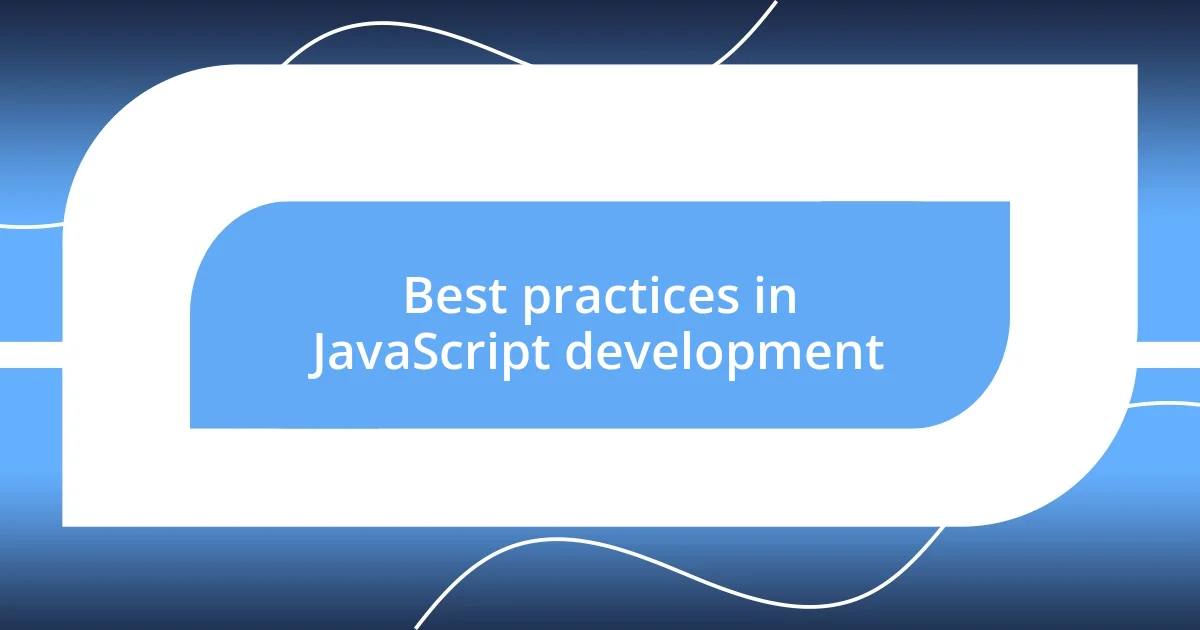
Best practices in JavaScript development
In my journey through JavaScript development, I’ve come to appreciate several best practices that not only make coding more efficient but also more fulfilling. One of my mentors once highlighted the significance of using version control systems like Git. It was during one of our projects that I made a modification I thought enhanced the functionality but ended up breaking everything. That’s when my mentor showed me how to revert changes seamlessly with Git, illustrating the importance of tracking every change. It felt empowering to know I could experiment freely without the fear of permanently ruining my work.
Another essential practice I picked up is the habit of writing modular code. This approach of breaking down complex tasks into smaller, reusable functions changed my coding style drastically. I remember tackling a particularly challenging feature, and instead of writing a long function, I created smaller ones that each handled specific tasks. This not only made debugging easier but also gave a sense of accomplishment—each small function that worked felt like a mini-victory. Here’s a quick list of best practices that have become part of my standard toolkit:
- Version Control: Always use systems like Git to track changes and collaborate seamlessly.
- Modular Code: Break tasks into smaller, reusable components for enhanced readability and maintainability.
- Consistent Naming Conventions: Adopt clear naming practices to ensure your code remains understandable.
- Code Comments: Provide intentional comments to clarify complex logic for future reference.
- Regular Refactoring: Periodically revisit and refine your code to improve its structure and efficiency.
Adopting these practices didn’t just make my code cleaner; they fostered a deeper sense of pride in my work. Each small improvement felt like I was stepping closer to mastering my craft. Only now do I truly appreciate the value of working smart alongside working hard.
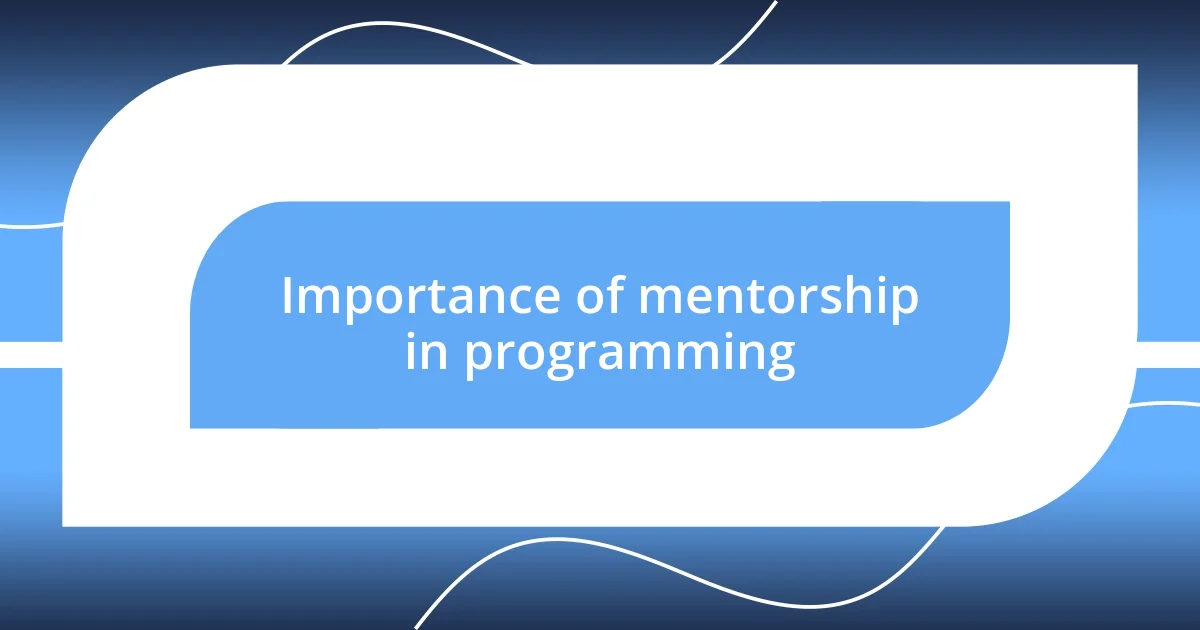
Importance of mentorship in programming
Just as a solid foundation is crucial for any building, mentorship plays a vital role in programming. I’ve learned that having someone to guide you through the complexities can illuminate pathways that might otherwise remain hidden. I remember feeling lost when grappling with asynchronous JavaScript. My mentor patiently walked me through the concept, using real-world analogies. Suddenly, what once seemed daunting transformed into a clearer, more manageable challenge. Can you recall a time when someone’s guidance shifted your perspective?
Moreover, mentorship fosters a unique relationship that often leads to accountability and encouragement. I can distinctly remember facing a particularly challenging coding project that seemed insurmountable. My mentor didn’t just provide solutions; he motivated me to confront the problem on my own. This instilled a sense of confidence because I realized that I had the capacity to tackle it. Isn’t it incredible how a mentor can amplify our self-belief and empower us in our journeys?
Lastly, the value of diverse perspectives brought by mentors is something I greatly cherish. Each mentor I’ve had brought a different approach to problem-solving, broadening my understanding of programming practices. I still think back to our brainstorming sessions where varying opinions sparked intense but fruitful discussions. It reinforced the idea that collaboration isn’t about agreeing but about learning and evolving together. How do your mentors shape your approach to challenges?
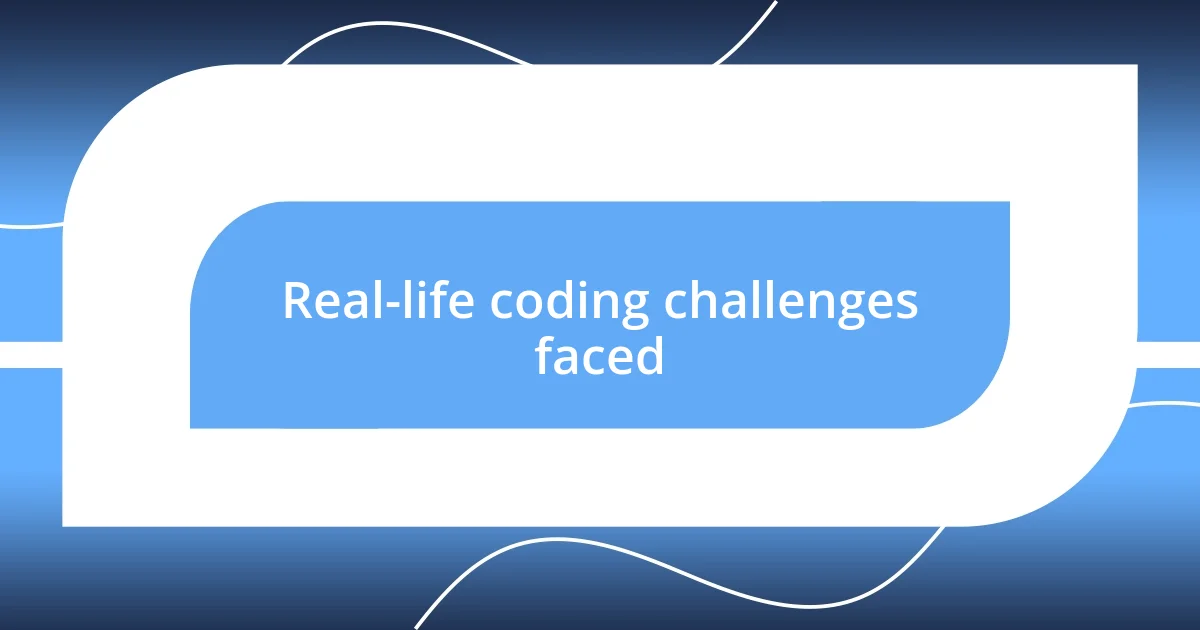
Real-life coding challenges faced
It’s fascinating how real-life coding challenges often emerge unexpectedly. I was knee-deep in a project when I encountered a bizarre bug that took hours to unravel. After numerous attempts to debug, my mentor suggested a different perspective: to step away for a bit and come back with fresh eyes. This simple advice led me to discover the issue was a minor typo—something I’d overlooked in my frustration. Have you ever been so close to a problem that you couldn’t see the solution right in front of you?
Another significant challenge I faced was optimizing performance in a web application. While developing a feature that required heavy data manipulation, the app’s speed suffered dramatically. My mentor encouraged me to analyze the underlying algorithms I was using. It was an eye-opener! I realized that implementing better data structures and utilizing efficient JavaScript methods improved the application’s speed exponentially. You have to wonder: how often do we overlook the importance of thinking critically about our approach to coding?
Then there was the unforgettable experience of integrating third-party APIs into my projects. Initially, it seemed straightforward, but anything that could go wrong, did. I’ll never forget the panic when an API I relied on suddenly returned errors during a live demo. My mentor reminded me of the importance of graceful error handling. By implementing fallback strategies, I learned not only to code defensively but also to embrace those moments when things don’t go as planned. Can you think of a time when a coding mishap became a lesson in resilience?
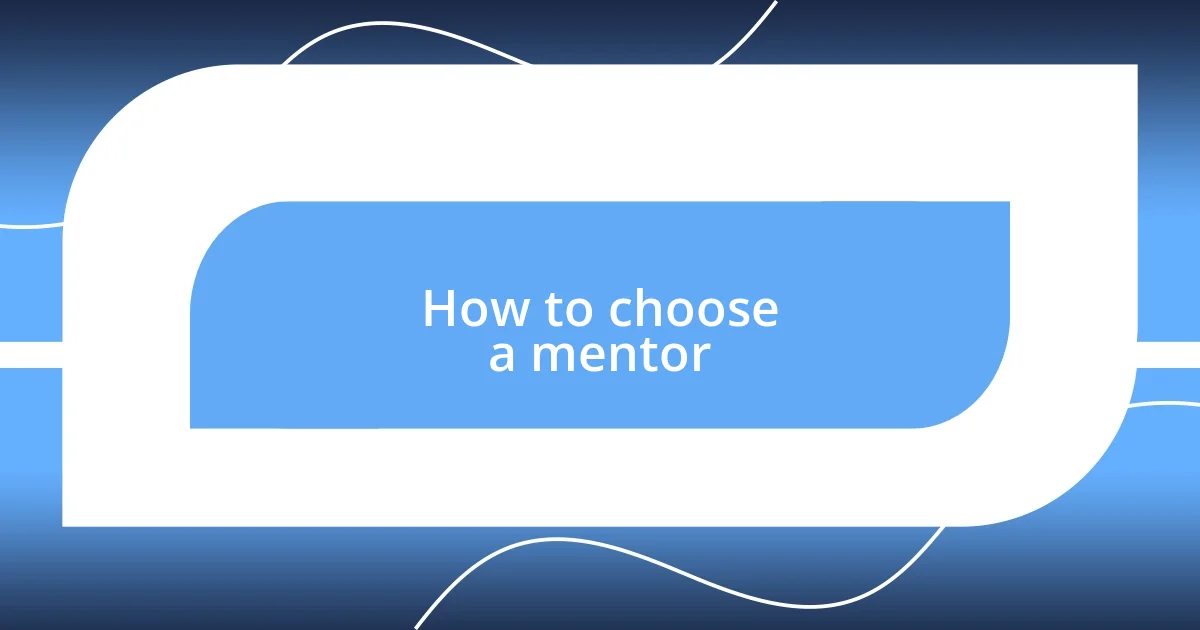
How to choose a mentor
Choosing the right mentor is crucial for your growth, especially in a field as dynamic as JavaScript development. First, I believe it’s essential to assess their expertise and experience. I remember connecting with a mentor who not only had vast technical knowledge but also real-world experience in the projects I aspired to tackle. Their guidance turned out to be invaluable, as they could relate to my struggles and provide advice that felt practical and immediately applicable. Have you ever considered how someone else’s experience can directly influence your learning journey?
Another critical aspect to consider is compatibility in communication style. I once struggled with a mentor whose teaching method felt too rigid for my learning style, leaving me frustrated more often than enlightened. When I finally found someone who used anecdotes and relatable examples—much like my style here—it transformed our interactions. Suddenly, complex concepts became conversations rather than lectures. Have you thought about what kind of communication fosters your understanding?
Lastly, it’s helpful to examine their commitment to mentorship. A mentor who is genuinely invested in your success will often go the extra mile. I had a mentor who would regularly check in on my progress and offer additional resources tailored to my growth. This kind of support made all the difference, as it felt like someone was truly in my corner championing my development. Isn’t it refreshing to know that the right mentor can ignite your passion and keep you accountable?
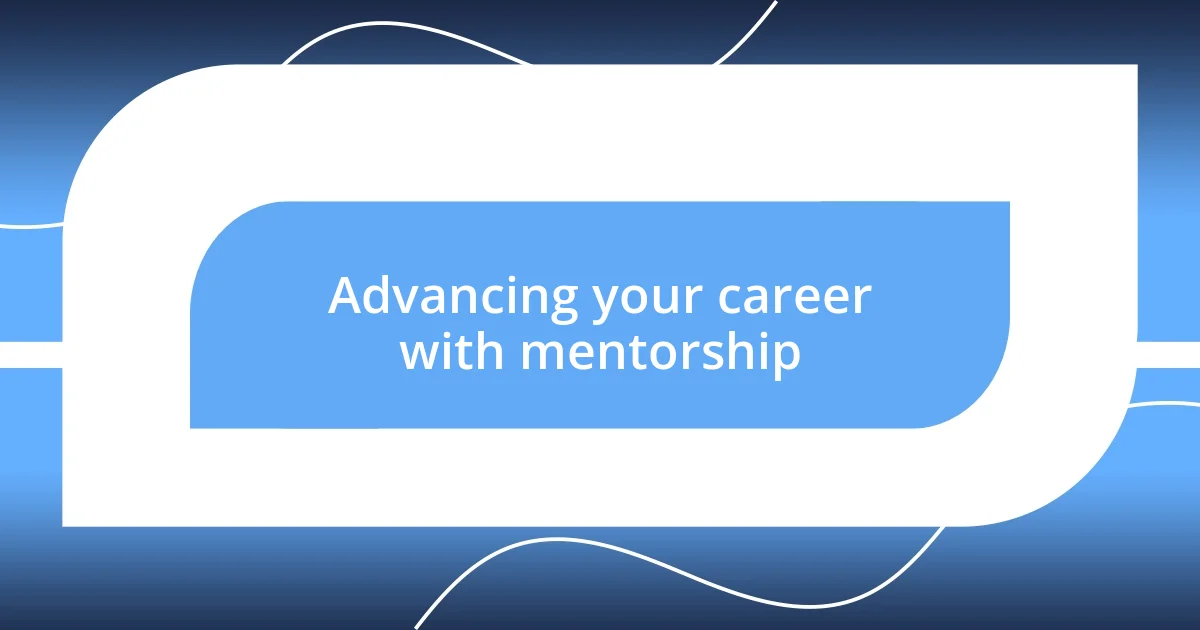
Advancing your career with mentorship
Mentorship can be a game-changer in advancing your career. I recall a pivotal moment when my mentor opened my eyes to networking opportunities I had never considered. It wasn’t just about coding skills; it was about building relationships. This realization changed my approach entirely. Have you ever thought about how connecting with others can lead to unexpected opportunities?
A mentor’s guidance often goes beyond technical skills; it’s about navigating your career path. I vividly remember struggling with the decision to shift specializations within my field. My mentor shared their own experiences of pivoting careers, emphasizing the importance of following my passion rather than sticking to a safe route. That conversation not only reassured me but also inspired me to take bold steps. Have you ever found yourself at a crossroads, unsure which direction to take?
Additionally, having a mentor provides a safety net for trial and error, which is essential for growth. I once pitched a project idea that seemed risky. My mentor supported my enthusiasm and encouraged me to refine my proposal, pointing out potential pitfalls while also highlighting strengths I hadn’t recognized. When the project launched successfully, it wasn’t just my win; we celebrated together. Isn’t it amazing how mentorship can amplify our victories and make them feel shared?












